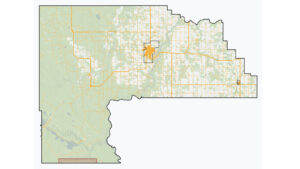The Breton area of Brazeau County will be home to approximately 300 more jobs in the near future, if a new hydrocarbon recycling facility goes ahead as planned.
Fiscal Energy Corporation has plans to develop the $100 million facility in the east end of Brazeau County. The company held a pair of open houses last week to speak to the landowners in the area.

Living Spirit United Church
Everyone welcome. Sunday Worship, 10:30 We are residents of Drayton Valley, members and adherents of

St. Anthony Catholic Church
St. Anthony’s Parish Drayton Valley. Weekend mass Saturday and Sunday

Church of God
Drayton Valley Church of God. Our Worship Services usually include: traditional hymns, praise choruses, and contemporary songs, prayer, scripture, and a sermon.

Life Church Drayton Valley
We know that exploring a new church can be an overwhelming experience. To help you

Ralcomm Communications
The Ralcomm Group provides communication devices for individuals and businesses. We specialize in technology that
Brian Gibbons, Vice President of Fiscal, says they have three sites that they are considering for the plant. Gibbons says they plan to locally source companies to help with the construction of the plant as well.
“At the core of what this technology is about, is to remove the hydrocarbon contamination from soil and other materials,” says Gibbons.
The technology, he says, was proven to work in a 34-month pilot project that took place in 1999. The reason for the time lapse in between then and now was that Cal Fisher, the president of Fiscal and the inventor of the technology, had to fight court battles to keep his rights for the patent.
In January 1965, the St. Anthony School opened its doors. Now, 60 years later, the school is planning a celebration of the milestone.
Principal Janelle Molzan says they are planning to have a celebration on May 24 at the school gym. They will be using the event to also fundraise for the school.
Molzan says they will have a band performing that evening, catering from a local restaurant, a full cash bar, as well as some door prizes.
Part of the celebration will also be the fact that St. Thomas Aquinas Roman Catholic School Division has put St. Anthony at the top of their priority list for a new school. Molzan says the division has to wait until next year to submit their request to the Province, and there is no guarantee that they will be selected for funding.
“It could be anywhere from two to ten years,” she says. “Or more.”
However, she feels that St. Anthony has a strong case for asking for a new school.
The most recent remodel of the school was in 1992, says Molzan. At that point they expanded the school, removing the gym from the centre of the school and installing classrooms instead. The new gym was then built as an addition to the school.
“We had the addition of the gym as well as a few classrooms in 1992,” says Molzan.
Since then, there have been no major remodels or renovations. Instead, the staff have been doing what they can to keep the building in shape.
“It’s a really well built school,” says Molzan.
She says over the years, the natural heaves and settling that occur with temperature fluctuations has led to some cosmetic damages to the building. “It’s just showing its age,” she says.
While the school is starting to show wear, Molzan says there are no capacity issues. About 15 years ago, the school went from being a K-12 school to a K-8 school when the Holy Trinity Academy was built.
Molzan says if they don’t get a new school they will have to pursue getting more renovations or remodeling for the current building.
New trespassing program helps businesses
Businesses will now have another option for dealing with trespassers thanks to a new program that Enforcement Services have put into place.
Cody Rossing, the manager of enforcement services and emergency management for the Town, says one of the biggest challenges for businesses in the community who were issuing trespass notices is that someone has to attend court in order for the trespassing charge to stick. With the new Trespassing Agent program which comes into place on March 20, businesses who enrol will not have to attend court.
Previously, businesses who contacted the RCMP to report a trespasser had to issue the trespass notices themselves.
For many businesses the process didn’t work well. Larger franchises, like banks, found arranging the issue of a trespass notice and attending court was not logistically feasible. Small business owners, on the other hand, could issue the notice but may have to close their business in order to attend court.
Rossing says there are two different pieces of legislation that speak to trespassing, the Petty Trespass Act and the Trespass to Premises Act.
“Under both of the legislations, the property owner or their agent are required to provide trespass notices, help get people off of their land, and stuff like that,” says Rossing.
The first offence fine under the provincial legislation is normally $600, but it could be up to $10,000. A second offence could have a fine of up to $25,000
The higher fines come into place when the individual ignores the notice and returns to the property. If the trespasser returns three times, the officers can then issue a summons to court. If they fail to attend, a warrant is issued, and at that point if they are found guilty, the higher fines can be given.
Rossing says the program is helping streamline the process for businesses. If they choose to enrol in the program, it will allow peace officers or the RCMP to act as their agent and issue the notices. It also means the business owners won’t have to attend court.
“Court is scary for a lot of people, and we understand that,” says Rossing.
The purpose of the program is to improve the process because officers are continuing to get calls to the same place over and over and business owners or their employees are uncomfortable with the court process. Until now, there hasn’t been any way to address those issues.
“It’s been a lot of work on the back end because there is no follow up process in place and there is no trespass notice being issued,” says Rossing.
He says the hope is that by having this program in place, businesses can sign up and they can begin to address the issue more efficiently.
Several different municipalities in the province have a similar program in place, says Rossing. While developing the program, Rossing did research on other initiatives and reached out to other municipalities that had something similar in place. He says he wanted to be sure that he had everything in place before he announced the program in the community.
There are also checks and balances that have been worked into the program.
“If you’re trespassed from a local business, one of our officers shows up and says you’re trespassed for six months, if you don’t agree with it, you can appeal that process,” says Rossing.
He says there is also the option for the business owners to speak with the officer and reduce the amount of time the individual is trespassed for. In some cases, if the RCMP issue a notice that’s in effect for six months, a business owner may come forward and advocate for the trespasser if the individual doesn’t normally behave in that manner
“They can say, ‘This person is normally a good customer, but there is something going on with him right now. I think maybe a month would be more appropriate,’” says Rossing.
However, it is ultimately the final discretion of the officer.
Once a business is enrolled in the program, they will receive a sticker that they can place in a conspicuous area that is easily visible for officers. If they receive a call, the officer will know that they can issue the notice themselves rather than speaking to the owner and explaining the process that has to take place.
Rossing says enrolment in the program is free, and he encourages businesses to sign up if they are having consistent issues with people loitering or being a nuisance on their property. Those who are interested in enrolling can visit www.draytonvalley.ca/enforcementservices/trespassingagent and fill out the form. They can then email it in to enforcement@draytonvalley.ca or drop it off at the Town office.
Technology bring collisions into focus
There are approximately 187 accidents in town each year within Town limits. That’s according to data from Drayton Valley Enforcement Services.
Cody Rossing, the Manager of Enforcement Services and Emergency Management for the Town, says data from 2016-2023 has helped map out intersections in the community that sees the highest number of collisions. The intersection at 50 Street North and Hwy 22 has had eight collisions, the highest in the community. The second highest number was at the intersection of 50 Street and 50 Avenue.
“Anything along Highway 22, the Town doesn’t have jurisdiction over, pertaining to road designs or changes,” says Rossing.
He says getting the data from the Province regarding collisions along Highway 22 is something they haven’t been able to do before. Now that they have the data they can start mapping out the high incident intersections and starting brainstorming ways they can address some of the problem areas. Rossing says those areas will have more focus from the community peace officers.
Rossing says they are trying to develop strategies on how to reduce collisions in the community on a whole, particularly those that result in fatalities.
“There’s different things we can use like engineering and controls,” says Rossing. “But for enforcement services, how are we strategically educating and enforcing in those areas?”
He says there are a number of factors that can contribute to collisions. Over the past eight years there have been 434 caused from unsafe speeds, 245 were intersection related, 163 that are weather related, 114 from road surface conditions, 51 involving animals, and 417 were from drivers performing improper actions.
With speed being the most prominent cause, enforcement services have been taking action to find out where speeding is most common and increasing patrols. The digital speed signs that were purchased with funds from the Community Safety Committee don’t have cameras on them, but they do record the speed and report that data back to enforcement services.
On March 6, officers intercepted a vehicle driving 102 km per hour in a 50 km zone.
“That vehicle was pulled over, a court summons was issued to the driver to compel them to court. If they don’t attend court a warrant will be issued for them,” says Rossing.
If they are found guilty, they could face a fine of up to $2,000 and/or a license suspension.
Rossing says anyone who is over the speed limit by more than 51 km per hour will face an automatic court summons.
This was not the only incident of speeding. On March 5, the digital speed signs picked up on a vehicle driving 111 km per hour in a 60 km per hour zone. They also pulled over a vehicle going 50 km per hour over the limit that same day.
“That is strictly within the Town of Drayton Valley boundaries,” says Rossing.
There are a number of reports enforcement services can get from the digital signs, including the amount of traffic on a road and the times that see the most traffic. Using this data, enforcement services can ensure they deploy units during the busiest times of the day to the areas where speeding is common.
What you see is what you get
Like William Shatner, Mike Myers, Wayne Gretzky’s dad and God help us, Celine Dion, here at the Free Press, we are Canadian.
There’s been a lot of talk recently about US ownership of some of this country’s most prominent businesses and institutions. At the Free Press we are certainly not prominent, nor do we want to be institutionalized. But still, it seems like a good time to point out to anyone who’s interested, that we are exactly what we appear to be.
We are 100 percent locally owned. There are no hidden shareholders or outside interests. All of our staff live in either Drayton Valley or Brazeau County, apart from our designer, Brittany. She’s from here, but currently telecommutes from somewhere in British Columbia, which I have to confess, makes me a little jealous sometimes.
What else can I tell you? The Free Press is printed for us by some nice people in St. Albert. The printing press is owned by Great West Newspapers, which is also a Canadian company.
The paper we’re printed on comes from the Alberta Newsprint Corporation in Whitecourt. Incidentally, the paper is made from offcuts and waste from the lumber industry so we’re not cutting down trees to make the paper.
Once the paper has been printed it’s picked up and brought back to town by Drayton Valley’s own Rocket Express. At that point it’s back to us as we deliver it throughout the community.
Now you may be wondering why I’m telling you all this. Would the Americans really be interested in owning a tiny little paper in a small town in Alberta?
Well, you’d be surprised. A good chunk of Canada’s print media is currently in American hands, and that includes a number of community newspapers in this province. Postmedia is 66 percent owned by Chatham Asset Management, a hedge fund based in New Jersey. Who are Postmedia? They are the owners of the National Post, the Calgary Herald, the Edmonton Journal, the Calgary Sun, the Edmonton Sun and a host of other newspapers, both large and small, from coast to coast.
That situation may not be quite as bad as it sounds. I was the editor of the Drayton Valley Western Review (kids, ask your grandparents) for 10 years. During my time there the paper was owned by a succession of large, soulless corporations based in central Canada. They did absolutely nothing to impact the way we covered the news. I barely heard a peep in over a decade. I always suspected that was less to do with high journalistic standards at corporate headquarters, and more down to the fact they were only dimly aware we existed and probably couldn’t find Drayton Valley on a map, but either way the effect was the same.
So corporate ownership, whether it’s American or not, probably isn’t the best thing ever, but it isn’t necessarily fatal to Canadian news.
But I do think there’s an important distinction between a paper like the Free Press and some of the others; and it’s this. If you take out a subscription or buy an advertisement with us you can be confident that your money is staying close to home. And especially these days, that seems like a good investment.
Local auctioneer takes the championship
A local auctioneer has chanted his way into the history books after securing himself a first place position at the 2025 Canadian All Around Auctioneer Championship.
Prior to the 2025 CAAAC, Justin Mayer had already earned a trophy at the 2020 Canadian Bid Catching Competition. He is the first to hold a title for both competitions.
Mayer, at 29-years-old, says he’s been participating in the CAAAC for more than a decade. His mentors and many of the auctioneers he grew up listening to have all competed in the competition and some have won.
“It’s a pretty prestigious award,” says Mayer.
A good auctioneer is someone who can present themselves in a professional manner, with confidence in your body language and hand gestures. They have to be well spoken and comfortable with public speaking. The auctioneer chant, which requires rhythm, clarity, and speed to be considered such, is also an important technique that auctioneers must master.
“You should be able to almost dance to an auctioneer’s chant,” says Mayer
When he entered the CAAAC, Mayer participated in two rounds. The preliminary round ruled out everyone except for the top five. Those five then moved onto the final round.
In both rounds, five judges ranked their skills on a scorecard, and the person with the best overall ranking took home the award.
Mayer is not the first member of his family to take home the CAAAC title. His uncle Ron Sekura also held the title, and for Mayer, that makes the win even sweeter.
“He’s passed on, so it’s pretty cool for me to have the title with him,” says Mayer.
As a kid, Mayer was surrounded by some of his biggest mentors in the auctioneering world. His uncle, stepfather Corey Sekura, and grandfather, Wendell Sekura, all encouraged his love of auctioning.
He says he loves the sport because of the high energy atmosphere and the chance to meet people.
“When you’re up on the stand in front of the crowd selling, it’s up to me to present, in lots of cases, people’s livelihoods and their entire life, whether you’re selling a farm or a disbursement sale. It’s up to you, as the auctioneer, to generate excitement and do your homework in front of the crowd in order to bring top dollar for people,” says Mayer.
Over the years, Mayer has met many people and he says he enjoys the connections
“I know somebody from every town,” he says.
Now that he’s taken the title for the CAAAC, he is eligible for the International All Around Auctioneer Championship and from there he can head off to the World Championship.
For many, the decision to go to the international championship would be easy, but Mayer says he’s not sure what he’s going to do.
“I grew up in an auction family, and for me and my family to win this competition was a big deal,” says Mayer. “Now that I’ve won it, I kind of feel like I achieved what I wanted.”
However, Mayer has been receiving encouragement from Rob Bergevin, a Canadian International and Worlds competitor, to go to the International Championship.
“I beat him this year and he’s really trying to convince me to go to the International because he thinks I have a shot at it,” says Mayer.
Mayer’s love of auctioneering resulted in him going to Western College of Auctioneering in Billings, Montana in 2013. Since then, he’s been building up his reputation as an auctioneer across Alberta and British Columbia.
He says his uncle and stepfather were always in his ear, pointing out areas where he could do better and giving him advice to improve his skill.
“Grandpa Wendy was a big factor in that as well,” says Mayer.
For several years, Mayer spent a lot of time travelling to municipalities across the province and British Columbia to local auctions. However, once the pandemic hit, many auction houses opted for online auctions as a way to still run the business while meeting government regulations. Since that time, it’s not uncommon for auctions to be held online.
“But I still travel around,” says Mayer. “I still do lots of auctions. I’m never going to stop. It’s too exciting.”
Over the years, Mayer has worked for Team Auctions, as well as auctioning off classic cars. He also works for a lot of charity auctions.
When his children were younger, they struggled with the amount of time that Mayer was away. Now that they’re older, he says they appreciate it more. His daughter has even been asking for lessons, and has been practicing reading off a list of numbers that she has on her wall.
Mayer says he’s grateful to everyone for their support and encouragement over the years.
“I’m tremendously thankful to my mom, my dad, the Sekura family, my wife and my kids. They have all been there for me. They’ve all shaped me,” says Mayer. “Probably my biggest influence in all of it was my Uncle Ron, and my dad, Corey. They really shaped me and supported me.”
Charter school proposal moving forward
Members of local indigenous groups are working toward opening a charter school with the goal of offering students an education that goes beyond academics.
Charlene Bearhead, a member of the board for the Roots of Resilience not-for-profit society, says the group is applying to the Minister of Education to be able to open a charter school in Drayton Valley, with a goal of opening in September.
The society is hosting an information night on February 13 from 5-7:30 p.m. at the Holiday Inn Express.
Bearhead says her 40 years of working in education has made it clear that the system is failing children and staff as human beings.
“I’m always a big believer in doing the best you can to try to work with what exists already and do what you can to help guide that,” says Bearhead.
She worked within the system, and recently served as a school board trustee, but she says people weren’t ready to progress with changes she feels need to be made.
The goal of opening the charter school is to offer a learning experience that encompasses a child’s entire wellbeing, including mental and spiritual health, along with teaching Alberta’s curriculum. While the students will learn from methods that indigenous people have always used for passing on knowledge, Bearhead says the school isn’t just open to indigenous children. Any child in the area from Kindergarten to grade 12 will be welcome to attend.
One thing that Bearhead wants the public to be aware of regarding charter schools is that they are still public schools. Roots of Resilience will be funded in the same manner that Wild Rose School Division and the St. Thomas Aquinas Roman Catholic School Division are.
“One lady said to me, ‘This sounds so amazing Charlene, but I really struggle with anything that takes away from public schools,’” says Bearhead. “I had to say to her ‘This is public education. This is public school.’”
She says there are only provisions for charter schools in Alberta. Charter schools receive the same funding for facilities, transportations, and other expenses, and the same requirements to follow the Alberta curriculum and the Education Act. Just like any other public school, parents do not have to pay extra to enrol their children in a charter school.
“But they are intended to be schools of choice,” says Bearhead. “They give parents and kids a choice in their education.”
However, charter schools are not without controversy. According to the website of Alberta Teachers’ Association, “there is only one pot of money for schools in Alberta. When money is diverted to private and charter schools, it leaves public schools in a funding shortfall.”
Bearhead says charter schools have to offer a unique approach to education that isn’t available in the geographic area. Bearhead says it’s important to the RoR society to define the holistic success for the school, which means the students will be doing better in body, mind, and soul, as well as academically.
She says that pushing people hard to do well academically while ignoring all other aspects of the student’s progress doesn’t work well. For Bearhead, it’s important for educators to meet the students where they’re at, value them as human beings, offer them a safe environment, and offer opportunities for the students to see themselves reflected in what is being taught.
Along with the regular curriculum, Bearhead says they plan to offer language programs for those who are interested in learning the language of their ancestors to help those students connect with their heritage.
Wendy Snow, the Interim District Captain in the Otipemisiwak Metis Government for District Eight and member of the RoR society, says she feels her own children would have benefitted from what the proposed school will be offering.
Snow says she has two children as well as a niece that she is the guardian of. With all three of them going to school in Drayton, she says they went to almost every school in the community.
“I found that it was very lacking as far as teaching to our culture,” says Snow.
She says every year she would fill out the demographic forms, indicating that her children were indigenous, knowing that the school division would get additional funding for those students.
“I found that all of the funding in the Wild Rose School Division went to Rocky Mountain House,” she says. “All the programming, all the culture stuff, everything went to Rocky Mountain House.”
Like Bearhead, Snow wanted to work with the system and try to help improve things. She ran twice for school board trustee, but did not get elected.
“I’ve always wanted to see more funding and programming and culture stuff in this area, just like there is in Rocky Mountain House,” says Snow.
Bearhead says the RoR school will resonate with indigenous children.
“An indigenous pedagogy, or approach to education, is about physical, mental, social, emotional, and spiritual [well-being]. Whatever that means to you. Everyone is indigenous to somewhere,” says Bearhead.
She says public charter schools are smaller and have unique approaches to education.
“They are actually intended to be models for how education could happen in any or all public schools,” she says.
Bearhead says when the students see themselves reflected in the content they’re learning, they have a better chance of relating to it and absorbing it.
By making the students the centre of the system, educators can focus on the whole child, not just the content they’re supposed to be learning. She says each student has different strengths, weaknesses, interests, and paths. In their school, they plan to help students excel at their strengths, offer support for their weaknesses, and encourage their interests and plans.
Another important part of education is offering the students a safe space.
“If kids are terrified, if kids are being bullied, if kids don’t feel safe, how can they focus on learning?” says Bearhead. “That’s just human instinct. That’s survival.”
She says if students are feeling ostracized, alienated, or left out, it’s more challenging for them to learn.
Roots of Resilience will also offer hands-on learning for students. This experiential learning will be land-based, which means there will be more of a balance between indoor and outdoor learning. She says there are many different areas of the curriculum that can be taught outdoors beyond science and physical education.
“For me, when you do something, rather than just read about it or hear about it, it becomes ingrained in you,” she says.
Snow says she wants to see children in the area have an opportunity to choose an education that best suits them.
“I think it just gives them a great basis for success later on in life,” says Snow.
“It’s a proven technology, we know it works,” he says.
He says the company picked Brazeau County because it is a central hub area that is easily accessible to many companies in the oil and gas industry.
“The main draw is the proximity. There’s a lot of traffic through Brazeau County,” he says.
The recycling plant, the first of its kind in Canada, will be taking in invert, contaminated soil, and other contaminated substances from spills or tailing ponds that would normally just get packed into a landfill. They will pull the hydrocarbons out of the substance and then the substances can be put back into use.
Gibbons says the timeline for the project will consist of three phases. First, they need to have the substances trucked into the facility, and that will be their main focus initially. Next, they will have to work on processing those substances, and he estimates they can begin this in a year. Thirdly, they plan to do everything in their power to mitigate the carbon emissions the facility will have and are making plans for that.
Grade 4: Let's learn about the Newspaper
Introduction
My name is Mrs. Brandy Fredrickson (I am Ruth’s mom) and I own the Drayton Valley and District Free Press newspaper. I used to be a reporter a the Drayton Valley Western Review…20 years ago. In this job I met some amazing people and learned so much about my community. My co-workers from 20 years ago are now my staff and we still have a lot of fun writing about Drayton Valley.
Question: What is one thing (person, place, team) that makes Drayton Valley a special place for you?
What is a newspaper?
A newspaper is a collection of stories, photos, advertisements, columns and letters that represent the collective news and mood of your community at a given point in time.
Types of Newspaper
National Newspapers: National Post, Globe and Mail
Provincial Newspapers: Edmonton Journals, Calgary Herald
Regional/Local Newspapers: That Us! Often these papers are locally owned, family started and some are 60-100 years old.
Other Regional:
Activity 1: Get to know the newspaper
Activity: Seek and Find
What you need: 1 piece of paper, 1 pencil, 1 Free Press Newspaper
- Get into groups of 4
- On a piece of paper write down numbers 1-5
- Find these 5 things in the paper
- Bring your answers up to me and shake my hand when you’re done
- Two Fastest teams get a treat

And Go....
- What is the tagline under the “Free Press” masthead on pg. 1?
- Who wrote the letter about the ski hill (name)?
- Who took the photo on pg. 11?
- Name one business in the business directory?
- Who is the editor of newspaper (name)?
Layout Discussion:
How is a paper the same as a magazine? How is the newspaper different than a book?
Getting in front of eyeballs: How is the newspaper distributed?
Making sure the newspaper is seen is a big part of having a local newspaper. Distribution channels helps to make this happen. The Free Press has 3 distribution channels.
1. Email Subscriptions
2. Canada Post mail subscriptions
3. Free pickup in retail locations
Discussion:
How does your teacher share information with you? And how do you share information with your parents?
Activity: Watch Video of the printing press
Fact Checking and Credibility
“Thou shalt not lie.”
Discussion: Why do you think it is important not to lie?
Credibility is the foundation of any newspaper. If your readers cannot trust what you are writing you won’t have an audience for long. This is why our editor spend much of his time fact checking, and rechecking facts in the stories we publish.
Activity 2: Is it True?
In your groups look at your newspaper and tell me if this headline is true.
Is this headline true?
- Town Council passes interim budget
- Volunteer database up and running
- Town billing changed despite strike
Activity 3: Examine a story
Mrs. Fredrickson Read: “Councillor Responds to Allegations”
What are some facts in this story that would need to be checked?
Activity 4: "Telephone " fact checking
- Get into 2 long lines
- Teacher select 2 people to be “fact checkers”
- Beginning at the start whisper message into your neighbours ear, and continue down the line.
- Once the message gets to a fact checker, the fact checker will give a thumbs up to continue telephone if the message is correct or go back to the start of the line to restart the telephone if the message is incorrect.
Here are some sources we use to check facts:
Call people to confirm information
Voice record interviews
Use multiple sources
Discussion
What ways can you check the facts for school projects or school gossip?
Jobs at a newspaper
Running a newspaper requires a team. Each person contributes to the success of the paper. Below are some jobs that people have to making a successful local newspaper.








Activity 5: Who does what?
In groups of 4 go to and PAGE 9 of the newspaper and label who did what.
E = Editor
R = Reporter
GD = Graphic Designer
C = Columnist
S = Sales
Activity 6: Conducting an Interview Speed Style
Interviewing people is a major job of a newspaper reporter. To conduct a good interview you need these three elements:
1. Questions; open ended
2. Paper and pen, or recorder
3. Listening ears and eyes
Open Ended Questions
Open ended questions are questions that get people talking. The are not yes or no questions. They are “How,” “Who,” and “What” questions.
Example: How did you feel winning the basketball game? What inspired you to write that story?
Recording Tool
Never go to a newspaper interview without a recording device; Paper, pen, voice recorder or texting device. Reporters often quote and paraphrase their subjects and accuracy is key.
Quote: “I love to teach,” Kormysh said.
Paraphrase: Kormysh said she loves teahing.
Active listening
Active listening means you are listening with your ears (close your mouth), your eyes and your body language. The key to a good interview is to get the other person talking this means you have to stop talking.
Speed Interview Game
1. Take out a piece of paper.
2. Write down 1 open ended question you can ask a classmates
4. When I say go, find a classmate and ask your question. Listen.
5. Record their answer.
6. Find someone new when I say “Switch”
7. Discussion: Report on what you learned? How accurate was your reporting?
Final Activity 7: Photo and Feedback
Take the handout and answer the following question.
A. What is one thing I learned about the newspaper?
B. Gather for a Group Photo
Police in Drayton Valley have seen an increase in the last year of arrests made under the Mental Health Act. Earlier this month Staff Sergeant Ryan Hoetmer told town council that calls of that type have seen a steady increase over the past several years, and they remain a big drain on resources for the Town.
Hoetmer explained that when the officers take somebody into custody under the act, they then take that person to the Centennial Centre for Mental Health in Ponoka. He says the drive itself eats up several hours of the officer’s time, but they also have to wait until staff at the centre take over.
He said the Centennial Centre has been working to make the intake process more efficient. In the past, officers have had to wait a couple of hours. Now, he says they make a call when they are on their way, and usually the intake is complete within half an hour.
When asked how long people are kept at the hospital, Hoetmer explained that they were normally kept for a week or two. At most, he believes they might be kept for a month.
Many of their calls under the Mental Health Act are from people the RCMP are already aware of, and Hoetmer says it can be a challenge keeping on top of those cases.
He says the RCMP bring the subject into the hospital. Once they are deemed healthy enough to depart, the person is often sent back to their community in a cab. After that, the individuals are in the same position they were in prior to the process beginning.
“I’m a big believer that there’s a bit of a gap there,” said Hoetmer. “When they are sent in a cab back to Drayton, they’re put back into the same position as before. There is no follow up program or some place for them to go in between.”
He said often RCMP watch the individuals as their mental health slowly declines until they have the grounds to apprehend them again.
Councillor Amila Gammana asked Hoetmer if he felt the reason people were being released on such a short timeline was due to a lack of resources. Hoetmer said he wasn’t sure what the reason for it was and that Alberta Health Services would better be able to answer that.
“I would hope it’s not a resourcing concern, that when the doctor is making their determination they are healthy enough to leave the facility,” he said. “But they have pressures, I’m sure, just like everybody else.”
Mayor Nancy Dodds asked Hoetmer if he’d seen an increase in resources since the new pillar ministries had been put into place, but Hoetmer says thus far they haven’t seen a change.
“We still have our one [Regional Police and Crisis Team] that operates out of Rocky, but as I’ve talked about before they are in our community maybe once a week,” said Hoetmer.
This means if there is an emergent issue that requires a response, the RPACT are not the ones who are responding to the call. It is instead left to the members of the Drayton Valley detachment.
“They do lots of follow up for us, but it’s our members that are doing the apprehensions and are going to the crisis when it’s happening,” said Hoetmer.
Moving to a new place can be stressful even if you are only moving one town over, but if you’re coming in from a different country, it can be overwhelming.
Verna Wicks, with Drayton Valley Community Learning (DVCL), is working together with other organizations in the community to build a Newcomers Support Team. The group is geared toward connecting people moving to the town or county with services they will need to get established.
What might feel like common sense to many people is not so easy for New Canadians. If they aren’t fluent in English or don’t know anyone in the area, setting up basics, like bank accounts and getting set up with Alberta Health Care could seem nearly impossible.
Wicks says interested parties decided to offer those supports early in 2024, but it wasn’t until DVCL received some grant funding last fall that they were able to hire someone for the group.
She says there are a number of groups who have been involved in setting up the team, including Family and Community Support Services, Alberta Health Services, the Multicultural Association, the library, the Town, the Chamber of Commerce, the Alberta Government, and many members of the public.
Similar to the Youth Hub, the support team is aiming to be a one stop connection point for newcomers. Wicks says the goal is to open a welcome centre that they can be directed to. At the centre, the newcomers will be connected with people and services in the community to help get them settled in.
Along with information and support, Wicks says they hope to also be able to give out a care package.
“We’re hoping that we’ll have some supplies for them if they need clothing or things for babies,” says Wicks.
The team would also like to host social events to help them meet new people. Last fall, they held their first welcoming event.
“That was open to newcomers and people from the community who wanted to welcome them,” she says.
Right now, the team is looking around the area to see which services are already being offered. Then, if they find any gaps, they can step up and provide something to meet those needs.
They are also putting together a document that can be given to immigrants in the community. She says it will contain a lot of basic information including contacts for different religious groups, and contacts for community and emergency services.
Wicks says there’s also a balance that the team needs to find. Right now there are many newcomers coming to the community. Some are refugees, some are looking for work, and others are coming through programs like the Rural Renewal Stream. However, the amount of newcomers may not always be so high.
She says there are also concerns about steady government funding. Recently, the federal government announced they would be cutting back on funding for support services for new immigrants. While the brunt of that will likely be felt in larger centres, Wicks says it’s making them cautious about asking for funds from any level of government.
The grant the team received in 2024 was renewed for 2025, but they won’t know for sure if it’s renewed for 2026 late 2025 or early 2026.
Anyone looking for more information about the team or the support they provide can reach out to Wicks at settlementservices@dvcommunitylearning.ca.
All good things must come to an end. The Drayton Valley Community Bus Association, which has been a fixture in the area since the 1970s, has ceased operations.
In an interview with the Free Press last week, Wendell Smith, the association’s treasurer, said a number of factors played a part in the decision to close effective December 21 last year. The majority of those factors revolved around increasing expenses and declining ridership.
“Diesel fuel is higher, insurance is higher. People don’t want to pay,” he said.
The bus association has played an important part in the growth of Drayton Valley. It was incorporated in May of 1973 by local business owners who were concerned about highway safety and who wanted to contribute something positive to the community.
“They bought a bus and founded the bus association and it’s been running ever since,” said Smith.
Over the last half century the bus association has covered hundreds of thousands of kilometres taking local residents to events across this part of Alberta and further afield. Many of those journeys were on school field trips or for minor hockey or other sports. Smith, who has been driving since 2001, said he’s happy to have played a part in the lives of so many local residents and is proud of the association’s record for getting people where they needed to be.
“We drove the Thunder for 25 years,” he said. “In all those years we were never late for an out of town game.”
Smith says at one point the association operated as many as “six or seven” buses. However, changing times have seen increasing numbers of potential riders using their own vehicles to attend out of town events. In recent years the number of buses operated by the association decreased to three; a 58 passenger coach, a 21 passenger mini bus and a 44 passenger school bus. Declining demand for busing means that those vehicles will now be put up for sale.
“The economy is hurting everybody,” he said. “If the economy isn’t booming people don’t have the money to hire a bus. I can’t blame any business for not using the service … The money’s just not there.”
After concerns raised at a pair of public meetings late last year, interim CAO for Drayton Valley, Pat Vincent, demonstrated the Town’s commitment to businesses and residents by presenting council with a detailed report that spoke to a range of issues at the last Governance and Priorities meeting.
Erik Bergen, a local business owner, came forward on November 20 with a presentation he had put together after having two open meetings with businesses in the community earlier in the fall. In his presentation, Bergen highlighted three main areas of concern: the homeless population, Town services and communications, and the free enterprise market in the community.
Bergen outlined several of those concerns as well as possible solutions for council to consider.
In the report Vincent brought forward, there were five separate responses from management involved in the areas that the businesses had issue with.
Enforcement services touched on several areas brought forth by Bergen. This included listing the various bylaws and acts that already addressed many of the areas of concern with the homeless population. The Community Standards Bylaw, the Municipal Government Act, and provincial trespassing legislation combined cover sleeping in public places, public disruption, loitering, public urination and defecation, unauthorized encampments, open fire, storage of personal items, and dumpster diving.
Cody Rossing, the manager of enforcement services and emergency management, also outlined areas that the Town could consider to help bolster the current laws surrounding those issues, such as amendments to the Outdoor Restrictions Burning bylaw and some possible amendments to the Community Standards Bylaw.
Rossing also explained that Drayton Valley could not create its own lower level court system to deal with petty crimes. However, he did say the community could petition for more court dates in Drayton Valley, which would allow more time for the courts to deal with all matters.
“Currently, with the scheduling at the Drayton Valley Court of Justice, trial dates are occurring on the same days for criminal code matters, provincial matters and municipal bylaw matters,” he says in his report. “This often results in lower-level offences either being withdrawn, or deals made to have the lower-level items removed so time can be focused on criminal code matters.”
As far as public safety in regards to needles, Rossing says they received only one call in 2023 from a business owner. In the past six months the Town’s Occupational Health and Safety Department only had four reports of Town staff locating needles.
Lola Strand, the manager of community services for the Town, spoke to the number of homeless individuals in the community and the efforts made to address the issue.
She mentioned the 2023 study done by the Rural Development Network, that found there were more than 8,300 individuals in rural Alberta dealing with some sort of housing issue. In Drayton, there were 28 people without homes, 25 people accessing emergency shelters such as the shelter pods or warming hearts, 83 people who were provisionally accommodated through things like couch surfing, and 140 individuals who were at risk of homelessness due to precarious housing.
Strand spoke to the strain enforcement services were dealing with in regard to responding to complaints of unsheltered people. She says the Town received a grant to hire a Community Outreach Worker who is communicating with at-risk individuals to help connect them to resources.
She also pointed out that along with the temporary emergency shelters the Town has put into place, there are also 26 affordable housing units in the community. Humans Helping Humans, the local organization that currently runs the shelter pods, has also built nine homes with grants, donations, and volunteers that have helped 19 families move into the regular housing market.
Strand also suggested the Town could work with the province to build halfway houses, or using grant money to purchase seacans, or trailers that can provide shelters in the encampment around the landfill that many of the homeless population are currently using.
Jenn Stone with intergovernmental relations and communication for the Town, outlined the different ways that the Town communicates with its residents.
The Town has a threefold approach to communication: traditional media, social media, and direct communication.
With advertisements and news stories, the Town works with the Drayton Valley Free Press and Big West Country 92.9. They also have pages on social media, the Town’s website, and YouTube. The electronic sign located at 50 Street and 50 Avenue is also used for communications. On top of those methods, the Town has held open houses, public hearings, direct mail, and door-to-door notices.
By using these different options, the Town is providing several different methods of communication for all age demographics.
Public works also responded to the grievances in the report, specifically in regard to the insect population, weed control, and snow removal.
When it comes to pesticides and herbicides, the individual applying the substances has to be certified and trained in the use of the chemicals. If at any point the Town doesn’t have many employees that meet those criteria, it can be difficult for them to keep up with the applications.
When it comes to insects, the Town only sprays for stinging insects in public spaces. They work to stay on top of the issues and will follow up to check on activity. They also use the public portal the Town provides through their website, to learn about any issues that residents have raised a concern with.
Spraying for weeds also has its challenges. There are limited time frames in which the application will be effective, such as when the weeds are actively growing. Then they also have to work around the weather, as it won’t be as effective if it’s raining. If those two requirements are met, the Town also has to consider any events going on and provide notices to nearby businesses and residents before they begin spraying.
For snow removal on sidewalks, the Town currently clears 53.4 km of asphalt trails and sidewalks in the community. Prior to 2022, the Town was clearing sidewalks in the downtown core, however, an amendment to the snow removal policy in November 2022 removed the downtown core from areas to be cleared.
Public works says if they were to be responsible for removing snow from all sidewalks in the community, they would have to double their staff and equipment to keep up with it. They say it is a common issue with many municipalities and one that is becoming more and more challenging.
The report also addressed the business owners’ concerns surrounding a free market in the community.
Peter Vana, the interim general manager for planning and growth development in the community, says there are legal limits to what the Town can do in regards to limiting businesses.
Vana says the Municipal Government Act grants municipalities the power to regulate businesses, but not prohibit businesses. Vana provided examples of land use regulations in several communities to show the different ways that the issue can be approached.
Along with that, Vana made some suggestions that might help to alleviate the issue, such as making restaurants a discretionary use in all districts, providing varying business license fees, partnering with local businesses to help give them better strategies to succeed.
However, Vana also pointed out some issues with picking a particular sector to regulate. He says were the Town to put in regulations on franchises in the food industry, it should be applied to all industries across the board, including oil and gas, as well as retail, as companies like Walmart or Canadian Tire could be seen as a threat to local businesses.
Vana also mentions that many franchises are owned by local residents, so they are in many ways, just like other local businesses.
Other problems with restricting franchises that Vana brought forward included that the public would like to have competition as it offers options and keeps prices lower. He also pointed out, using pizza restaurants as an example, that there are eight restaurants that mainly sell pizza, nine other restaurants that sell pizza as a sideline, and two other businesses that occasionally sell pizza as well.
Vana questions whether or not the Town would have to be completely aware of the different items each restaurant sells when deciding whether a business should be allowed or not.
Council accepted the report as information after asking several questions of the departments. Vincent says he made the businesses aware the report was being discussed at the meeting, but there were no representatives for council to ask questions of.
The Town of Drayton Valley is looking to the future as the municipality works toward having the utilities in the community be self-sustaining services.
Elvera Thomson, the general manager of corporate services for the Town, says in the past, the surpluses from the Town’s utility operations could be anywhere from $2-3 million. Those surpluses didn’t necessarily go into a fund specifically for water and sewer, but there was lots of money being put into reserves in general.
However, there wasn’t a policy that dictated that a certain amount of funds from the water and sewer revenues had to be put in reserves.
“What ended up happening as the years went on and things got tough, we had a series of events that happened with Covid, cost of living, inflation, and more,” says Thomson. “To manage tax increases, we just put less and less into reserves.”
Now, with the looming bill of repairing and replacing integral infrastructure in the community, the Town is putting a policy in place that will ensure the surplus from the utility services will be put into a reserve fund specifically for infrastructure maintenance and replacement.
“We just got to a point where none [of the surpluses] was going into reserves and we need to get back putting a large portion of those going into an internally restricted reserve for water and sewer,” says Thomson.
Those funds will go toward replacing the aging systems for water and sewer in the community. That way, the Town will not have to rely so heavily on debt funding or government grants for the projects.
While the Town was advised by Matt Delormes with the Atlantic Infrastructure Management Network that they need to put away as much as they can to help offset future costs. He told them that the ideal number would be $8 million, but understood that it wasn’t always possible to reach that number.
Thomson says they will not be able to put that amount of money away, but they are now taking conscious steps toward building their reserves.
She says there are many small towns across the country that are in similar situations, as aging infrastructure hasn’t been at the forefront of anyone’s minds until problems are starting to occur.
“It’s not just a municipal problem,” says Thomson. “It’s a provincial and federal problem as well.”
Thomson says that after World War II, there was an infrastructure boom across Canada, and many smaller communities were able to expand. This means that most of that infrastructure is coming due around the same time, and the municipalities are going to be looking toward the provincial and federal government to help with the costs of replacement.
One of the ideas being considered is a greenhouse next to the facility. The process of removing the hydrocarbons will result in large quantities of carbon dioxide. Gibbons says they’ve seen projects where companies funnel the CO2 into greenhouses because it’s a gas that plants need to thrive.
“The processing is the core of the technology,” he says. “We pull all of them out: Ninety-nine point nine percent.”
At the moment, he says most companies are stockpiling these substances in landfills, and the goal of the recycling plant is to limit that from happening. Once they have removed the hydrocarbons, the substance is clean and can be used again.
“If there’s a spill and we pull all of the crude out of the dirt, that crude can go back on the market afterwards. That dirt can now be used safely,” he says.
Grade 4: Let's learn about the Newspaper
Introduction
My name is Mrs. Brandy Fredrickson (I am Ruth’s mom) and I own the Drayton Valley and District Free Press newspaper. I used to be a reporter a the Drayton Valley Western Review…20 years ago. In this job I met some amazing people and learned so much about my community. My co-workers from 20 years ago are now my staff and we still have a lot of fun writing about Drayton Valley.
Question: What is one thing (person, place, team) that makes Drayton Valley a special place for you?
What is a newspaper?
A newspaper is a collection of stories, photos, advertisements, columns and letters that represent the collective news and mood of your community at a given point in time.
Types of Newspaper
National Newspapers: National Post, Globe and Mail
Provincial Newspapers: Edmonton Journals, Calgary Herald
Regional/Local Newspapers: That Us! Often these papers are locally owned, family started and some are 60-100 years old.
Other Regional:
Activity 1: Get to know the newspaper
Activity: Seek and Find
What you need: 1 piece of paper, 1 pencil, 1 Free Press Newspaper
- Get into groups of 4
- On a piece of paper write down numbers 1-5
- Find these 5 things in the paper
- Bring your answers up to me and shake my hand when you’re done
- Two Fastest teams get a treat

And Go....
- What is the tagline under the “Free Press” masthead on pg. 1?
- Who wrote the letter about the ski hill (name)?
- Who took the photo on pg. 11?
- Name one business in the business directory?
- Who is the editor of newspaper (name)?
Layout Discussion:
How is a paper the same as a magazine? How is the newspaper different than a book?
Getting in front of eyeballs: How is the newspaper distributed?
Making sure the newspaper is seen is a big part of having a local newspaper. Distribution channels helps to make this happen. The Free Press has 3 distribution channels.
1. Email Subscriptions
2. Canada Post mail subscriptions
3. Free pickup in retail locations
Discussion:
How does your teacher share information with you? And how do you share information with your parents?
Activity: Watch Video of the printing press
Fact Checking and Credibility
“Thou shalt not lie.”
Discussion: Why do you think it is important not to lie?
Credibility is the foundation of any newspaper. If your readers cannot trust what you are writing you won’t have an audience for long. This is why our editor spend much of his time fact checking, and rechecking facts in the stories we publish.
Activity 2: Is it True?
In your groups look at your newspaper and tell me if this headline is true.
Is this headline true?
- Town Council passes interim budget
- Volunteer database up and running
- Town billing changed despite strike
Activity 3: Examine a story
Mrs. Fredrickson Read: “Councillor Responds to Allegations”
What are some facts in this story that would need to be checked?
Activity 4: "Telephone " fact checking
- Get into 2 long lines
- Teacher select 2 people to be “fact checkers”
- Beginning at the start whisper message into your neighbours ear, and continue down the line.
- Once the message gets to a fact checker, the fact checker will give a thumbs up to continue telephone if the message is correct or go back to the start of the line to restart the telephone if the message is incorrect.
Here are some sources we use to check facts:
Call people to confirm information
Voice record interviews
Use multiple sources
Discussion
What ways can you check the facts for school projects or school gossip?
Jobs at a newspaper
Running a newspaper requires a team. Each person contributes to the success of the paper. Below are some jobs that people have to making a successful local newspaper.








Activity 5: Who does what?
In groups of 4 go to and PAGE 9 of the newspaper and label who did what.
E = Editor
R = Reporter
GD = Graphic Designer
C = Columnist
S = Sales
Activity 6: Conducting an Interview Speed Style
Interviewing people is a major job of a newspaper reporter. To conduct a good interview you need these three elements:
1. Questions; open ended
2. Paper and pen, or recorder
3. Listening ears and eyes
Open Ended Questions
Open ended questions are questions that get people talking. The are not yes or no questions. They are “How,” “Who,” and “What” questions.
Example: How did you feel winning the basketball game? What inspired you to write that story?
Recording Tool
Never go to a newspaper interview without a recording device; Paper, pen, voice recorder or texting device. Reporters often quote and paraphrase their subjects and accuracy is key.
Quote: “I love to teach,” Kormysh said.
Paraphrase: Kormysh said she loves teahing.
Active listening
Active listening means you are listening with your ears (close your mouth), your eyes and your body language. The key to a good interview is to get the other person talking this means you have to stop talking.
Speed Interview Game
1. Take out a piece of paper.
2. Write down 1 open ended question you can ask a classmates
4. When I say go, find a classmate and ask your question. Listen.
5. Record their answer.
6. Find someone new when I say “Switch”
7. Discussion: Report on what you learned? How accurate was your reporting?
Final Activity 7: Photo and Feedback
Take the handout and answer the following question.
A. What is one thing I learned about the newspaper?
B. Gather for a Group Photo
Police in Drayton Valley have seen an increase in the last year of arrests made under the Mental Health Act. Earlier this month Staff Sergeant Ryan Hoetmer told town council that calls of that type have seen a steady increase over the past several years, and they remain a big drain on resources for the Town.
Hoetmer explained that when the officers take somebody into custody under the act, they then take that person to the Centennial Centre for Mental Health in Ponoka. He says the drive itself eats up several hours of the officer’s time, but they also have to wait until staff at the centre take over.
He said the Centennial Centre has been working to make the intake process more efficient. In the past, officers have had to wait a couple of hours. Now, he says they make a call when they are on their way, and usually the intake is complete within half an hour.
When asked how long people are kept at the hospital, Hoetmer explained that they were normally kept for a week or two. At most, he believes they might be kept for a month.
Many of their calls under the Mental Health Act are from people the RCMP are already aware of, and Hoetmer says it can be a challenge keeping on top of those cases.
He says the RCMP bring the subject into the hospital. Once they are deemed healthy enough to depart, the person is often sent back to their community in a cab. After that, the individuals are in the same position they were in prior to the process beginning.
“I’m a big believer that there’s a bit of a gap there,” said Hoetmer. “When they are sent in a cab back to Drayton, they’re put back into the same position as before. There is no follow up program or some place for them to go in between.”
He said often RCMP watch the individuals as their mental health slowly declines until they have the grounds to apprehend them again.
Councillor Amila Gammana asked Hoetmer if he felt the reason people were being released on such a short timeline was due to a lack of resources. Hoetmer said he wasn’t sure what the reason for it was and that Alberta Health Services would better be able to answer that.
“I would hope it’s not a resourcing concern, that when the doctor is making their determination they are healthy enough to leave the facility,” he said. “But they have pressures, I’m sure, just like everybody else.”
Mayor Nancy Dodds asked Hoetmer if he’d seen an increase in resources since the new pillar ministries had been put into place, but Hoetmer says thus far they haven’t seen a change.
“We still have our one [Regional Police and Crisis Team] that operates out of Rocky, but as I’ve talked about before they are in our community maybe once a week,” said Hoetmer.
This means if there is an emergent issue that requires a response, the RPACT are not the ones who are responding to the call. It is instead left to the members of the Drayton Valley detachment.
“They do lots of follow up for us, but it’s our members that are doing the apprehensions and are going to the crisis when it’s happening,” said Hoetmer.
Moving to a new place can be stressful even if you are only moving one town over, but if you’re coming in from a different country, it can be overwhelming.
Verna Wicks, with Drayton Valley Community Learning (DVCL), is working together with other organizations in the community to build a Newcomers Support Team. The group is geared toward connecting people moving to the town or county with services they will need to get established.
What might feel like common sense to many people is not so easy for New Canadians. If they aren’t fluent in English or don’t know anyone in the area, setting up basics, like bank accounts and getting set up with Alberta Health Care could seem nearly impossible.
Wicks says interested parties decided to offer those supports early in 2024, but it wasn’t until DVCL received some grant funding last fall that they were able to hire someone for the group.
She says there are a number of groups who have been involved in setting up the team, including Family and Community Support Services, Alberta Health Services, the Multicultural Association, the library, the Town, the Chamber of Commerce, the Alberta Government, and many members of the public.
Similar to the Youth Hub, the support team is aiming to be a one stop connection point for newcomers. Wicks says the goal is to open a welcome centre that they can be directed to. At the centre, the newcomers will be connected with people and services in the community to help get them settled in.
Along with information and support, Wicks says they hope to also be able to give out a care package.
“We’re hoping that we’ll have some supplies for them if they need clothing or things for babies,” says Wicks.
The team would also like to host social events to help them meet new people. Last fall, they held their first welcoming event.
“That was open to newcomers and people from the community who wanted to welcome them,” she says.
Right now, the team is looking around the area to see which services are already being offered. Then, if they find any gaps, they can step up and provide something to meet those needs.
They are also putting together a document that can be given to immigrants in the community. She says it will contain a lot of basic information including contacts for different religious groups, and contacts for community and emergency services.
Wicks says there’s also a balance that the team needs to find. Right now there are many newcomers coming to the community. Some are refugees, some are looking for work, and others are coming through programs like the Rural Renewal Stream. However, the amount of newcomers may not always be so high.
She says there are also concerns about steady government funding. Recently, the federal government announced they would be cutting back on funding for support services for new immigrants. While the brunt of that will likely be felt in larger centres, Wicks says it’s making them cautious about asking for funds from any level of government.
The grant the team received in 2024 was renewed for 2025, but they won’t know for sure if it’s renewed for 2026 late 2025 or early 2026.
Anyone looking for more information about the team or the support they provide can reach out to Wicks at settlementservices@dvcommunitylearning.ca.
All good things must come to an end. The Drayton Valley Community Bus Association, which has been a fixture in the area since the 1970s, has ceased operations.
In an interview with the Free Press last week, Wendell Smith, the association’s treasurer, said a number of factors played a part in the decision to close effective December 21 last year. The majority of those factors revolved around increasing expenses and declining ridership.
“Diesel fuel is higher, insurance is higher. People don’t want to pay,” he said.
The bus association has played an important part in the growth of Drayton Valley. It was incorporated in May of 1973 by local business owners who were concerned about highway safety and who wanted to contribute something positive to the community.
“They bought a bus and founded the bus association and it’s been running ever since,” said Smith.
Over the last half century the bus association has covered hundreds of thousands of kilometres taking local residents to events across this part of Alberta and further afield. Many of those journeys were on school field trips or for minor hockey or other sports. Smith, who has been driving since 2001, said he’s happy to have played a part in the lives of so many local residents and is proud of the association’s record for getting people where they needed to be.
“We drove the Thunder for 25 years,” he said. “In all those years we were never late for an out of town game.”
Smith says at one point the association operated as many as “six or seven” buses. However, changing times have seen increasing numbers of potential riders using their own vehicles to attend out of town events. In recent years the number of buses operated by the association decreased to three; a 58 passenger coach, a 21 passenger mini bus and a 44 passenger school bus. Declining demand for busing means that those vehicles will now be put up for sale.
“The economy is hurting everybody,” he said. “If the economy isn’t booming people don’t have the money to hire a bus. I can’t blame any business for not using the service … The money’s just not there.”
After concerns raised at a pair of public meetings late last year, interim CAO for Drayton Valley, Pat Vincent, demonstrated the Town’s commitment to businesses and residents by presenting council with a detailed report that spoke to a range of issues at the last Governance and Priorities meeting.
Erik Bergen, a local business owner, came forward on November 20 with a presentation he had put together after having two open meetings with businesses in the community earlier in the fall. In his presentation, Bergen highlighted three main areas of concern: the homeless population, Town services and communications, and the free enterprise market in the community.
Bergen outlined several of those concerns as well as possible solutions for council to consider.
In the report Vincent brought forward, there were five separate responses from management involved in the areas that the businesses had issue with.
Enforcement services touched on several areas brought forth by Bergen. This included listing the various bylaws and acts that already addressed many of the areas of concern with the homeless population. The Community Standards Bylaw, the Municipal Government Act, and provincial trespassing legislation combined cover sleeping in public places, public disruption, loitering, public urination and defecation, unauthorized encampments, open fire, storage of personal items, and dumpster diving.
Cody Rossing, the manager of enforcement services and emergency management, also outlined areas that the Town could consider to help bolster the current laws surrounding those issues, such as amendments to the Outdoor Restrictions Burning bylaw and some possible amendments to the Community Standards Bylaw.
Rossing also explained that Drayton Valley could not create its own lower level court system to deal with petty crimes. However, he did say the community could petition for more court dates in Drayton Valley, which would allow more time for the courts to deal with all matters.
“Currently, with the scheduling at the Drayton Valley Court of Justice, trial dates are occurring on the same days for criminal code matters, provincial matters and municipal bylaw matters,” he says in his report. “This often results in lower-level offences either being withdrawn, or deals made to have the lower-level items removed so time can be focused on criminal code matters.”
As far as public safety in regards to needles, Rossing says they received only one call in 2023 from a business owner. In the past six months the Town’s Occupational Health and Safety Department only had four reports of Town staff locating needles.
Lola Strand, the manager of community services for the Town, spoke to the number of homeless individuals in the community and the efforts made to address the issue.
She mentioned the 2023 study done by the Rural Development Network, that found there were more than 8,300 individuals in rural Alberta dealing with some sort of housing issue. In Drayton, there were 28 people without homes, 25 people accessing emergency shelters such as the shelter pods or warming hearts, 83 people who were provisionally accommodated through things like couch surfing, and 140 individuals who were at risk of homelessness due to precarious housing.
Strand spoke to the strain enforcement services were dealing with in regard to responding to complaints of unsheltered people. She says the Town received a grant to hire a Community Outreach Worker who is communicating with at-risk individuals to help connect them to resources.
She also pointed out that along with the temporary emergency shelters the Town has put into place, there are also 26 affordable housing units in the community. Humans Helping Humans, the local organization that currently runs the shelter pods, has also built nine homes with grants, donations, and volunteers that have helped 19 families move into the regular housing market.
Strand also suggested the Town could work with the province to build halfway houses, or using grant money to purchase seacans, or trailers that can provide shelters in the encampment around the landfill that many of the homeless population are currently using.
Jenn Stone with intergovernmental relations and communication for the Town, outlined the different ways that the Town communicates with its residents.
The Town has a threefold approach to communication: traditional media, social media, and direct communication.
With advertisements and news stories, the Town works with the Drayton Valley Free Press and Big West Country 92.9. They also have pages on social media, the Town’s website, and YouTube. The electronic sign located at 50 Street and 50 Avenue is also used for communications. On top of those methods, the Town has held open houses, public hearings, direct mail, and door-to-door notices.
By using these different options, the Town is providing several different methods of communication for all age demographics.
Public works also responded to the grievances in the report, specifically in regard to the insect population, weed control, and snow removal.
When it comes to pesticides and herbicides, the individual applying the substances has to be certified and trained in the use of the chemicals. If at any point the Town doesn’t have many employees that meet those criteria, it can be difficult for them to keep up with the applications.
When it comes to insects, the Town only sprays for stinging insects in public spaces. They work to stay on top of the issues and will follow up to check on activity. They also use the public portal the Town provides through their website, to learn about any issues that residents have raised a concern with.
Spraying for weeds also has its challenges. There are limited time frames in which the application will be effective, such as when the weeds are actively growing. Then they also have to work around the weather, as it won’t be as effective if it’s raining. If those two requirements are met, the Town also has to consider any events going on and provide notices to nearby businesses and residents before they begin spraying.
For snow removal on sidewalks, the Town currently clears 53.4 km of asphalt trails and sidewalks in the community. Prior to 2022, the Town was clearing sidewalks in the downtown core, however, an amendment to the snow removal policy in November 2022 removed the downtown core from areas to be cleared.
Public works says if they were to be responsible for removing snow from all sidewalks in the community, they would have to double their staff and equipment to keep up with it. They say it is a common issue with many municipalities and one that is becoming more and more challenging.
The report also addressed the business owners’ concerns surrounding a free market in the community.
Peter Vana, the interim general manager for planning and growth development in the community, says there are legal limits to what the Town can do in regards to limiting businesses.
Vana says the Municipal Government Act grants municipalities the power to regulate businesses, but not prohibit businesses. Vana provided examples of land use regulations in several communities to show the different ways that the issue can be approached.
Along with that, Vana made some suggestions that might help to alleviate the issue, such as making restaurants a discretionary use in all districts, providing varying business license fees, partnering with local businesses to help give them better strategies to succeed.
However, Vana also pointed out some issues with picking a particular sector to regulate. He says were the Town to put in regulations on franchises in the food industry, it should be applied to all industries across the board, including oil and gas, as well as retail, as companies like Walmart or Canadian Tire could be seen as a threat to local businesses.
Vana also mentions that many franchises are owned by local residents, so they are in many ways, just like other local businesses.
Other problems with restricting franchises that Vana brought forward included that the public would like to have competition as it offers options and keeps prices lower. He also pointed out, using pizza restaurants as an example, that there are eight restaurants that mainly sell pizza, nine other restaurants that sell pizza as a sideline, and two other businesses that occasionally sell pizza as well.
Vana questions whether or not the Town would have to be completely aware of the different items each restaurant sells when deciding whether a business should be allowed or not.
Council accepted the report as information after asking several questions of the departments. Vincent says he made the businesses aware the report was being discussed at the meeting, but there were no representatives for council to ask questions of.
The Town of Drayton Valley is looking to the future as the municipality works toward having the utilities in the community be self-sustaining services.
Elvera Thomson, the general manager of corporate services for the Town, says in the past, the surpluses from the Town’s utility operations could be anywhere from $2-3 million. Those surpluses didn’t necessarily go into a fund specifically for water and sewer, but there was lots of money being put into reserves in general.
However, there wasn’t a policy that dictated that a certain amount of funds from the water and sewer revenues had to be put in reserves.
“What ended up happening as the years went on and things got tough, we had a series of events that happened with Covid, cost of living, inflation, and more,” says Thomson. “To manage tax increases, we just put less and less into reserves.”
Now, with the looming bill of repairing and replacing integral infrastructure in the community, the Town is putting a policy in place that will ensure the surplus from the utility services will be put into a reserve fund specifically for infrastructure maintenance and replacement.
“We just got to a point where none [of the surpluses] was going into reserves and we need to get back putting a large portion of those going into an internally restricted reserve for water and sewer,” says Thomson.
Those funds will go toward replacing the aging systems for water and sewer in the community. That way, the Town will not have to rely so heavily on debt funding or government grants for the projects.
While the Town was advised by Matt Delormes with the Atlantic Infrastructure Management Network that they need to put away as much as they can to help offset future costs. He told them that the ideal number would be $8 million, but understood that it wasn’t always possible to reach that number.
Thomson says they will not be able to put that amount of money away, but they are now taking conscious steps toward building their reserves.
She says there are many small towns across the country that are in similar situations, as aging infrastructure hasn’t been at the forefront of anyone’s minds until problems are starting to occur.
“It’s not just a municipal problem,” says Thomson. “It’s a provincial and federal problem as well.”
Thomson says that after World War II, there was an infrastructure boom across Canada, and many smaller communities were able to expand. This means that most of that infrastructure is coming due around the same time, and the municipalities are going to be looking toward the provincial and federal government to help with the costs of replacement.

Local auctioneer takes the championship
Jason Mayer of Drayton Valley wins the 2025 Canadian Auctioneer Championship with Team Auctions, making history in auctioneering excellence.

Charter school proposal moving forward
Roots of Resilience aims to open a public charter school in Drayton Valley, Alberta, blending Indigenous knowledge with holistic education for all K-12 students.

Mental health calls drain resources
Drayton Valley RCMP see rising Mental Health Act arrests, straining resources. Mental health crisis intervention in Alberta needs improvement.

Support group for new Canadians
Verna Wicks, with Drayton Valley Community Learning (DVCL), is working together with other organizations in the community to build a Newcomers Support Team.

















